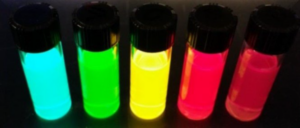
Tetramer, based in Pendleton, near Clemson University, is working with a team from the University of Chicago on a million-dollar U.S. Army contract. (Photo/Ross Norton)

Tetramer, based in Pendleton, near Clemson University, is working with a team from the University of Chicago on a million-dollar U.S. Army contract. (Photo/Ross Norton)
Pendleton company awarded $1M US Army manufacturing tech contract
Ross Norton //February 6, 2024//
An Upstate company is teaming up with a University of Chicago research team on a $1 million project they say could expand the capabilities and applications for infrared photodetectors, with results that could improve manufacturing processes and military use.
Tetramer Technologies LLC of Pendleton has been awarded a U.S. Army Small Business Technology Transfer Phase II contract to work on colloidal quantum dots and infrared photodetectors (IRPDs), according to a news release from the company.
 According to an abstract in the American Chemical Society’s publication Chemical Review (2021), “colloidal quantum dots are nanoscale semiconductor crystals with surface ligands that enable their dispersion in solvents. … Colloidal quantum dots can be integrated in devices using solution-based assembly methods to position single quantum dots and to create ordered quantum dot arrays.”
According to an abstract in the American Chemical Society’s publication Chemical Review (2021), “colloidal quantum dots are nanoscale semiconductor crystals with surface ligands that enable their dispersion in solvents. … Colloidal quantum dots can be integrated in devices using solution-based assembly methods to position single quantum dots and to create ordered quantum dot arrays.”
Related story: Pendleton company awarded funding to improve environmental safety of turbines
Quantum dots can reduce manufacturing costs and improve reliability and performance of infrared cameras used in applications for both military and civilian use, the news release said. The program is undertaken in collaboration with a research group at the University of Chicago led by chemistry professor Dmitri Talapin along with industry partners.
Infrared photodetectors are used in short-wave infrared cameras to detect infrared light and convert it into an electrical signal. They are utilized in applications from night vision and thermal imaging to environmental monitoring, medical diagnostics and consumer electronics, according to the Tetramer website.
Tetramer principal investigator Stephen Hudson said om the release: “This represents a huge opportunity to expand the capabilities and available applications for IR photodetectors. The ability to produce these quantum dots with high reproducibility would be an enhancement to the supply chain for IR sensor manufacturers, reducing their manufacturing costs and lowering barriers for new end-users to implement IR-based technologies. We expect this to have a dramatic impact on the IRPD market within the next few years.”
Current infrared sensors use materials such as mercury cadmium telluride that can be costly to produce and require integrated cooling systems to operate effectively, according to the Tetramer website. Those materials are challenging to shape into anything beyond flat 2-D forms, limiting their versatility in more advanced sensor designs and pushing the price range from $30,000 to more than $100,000, a cost that can be a barrier to using IR sensors in various applications.
“Our collaborative team, which combines Tetramer’s experienced scientists with the talented researchers from the University of Chicago, is well-suited for the challenge,” Jeff DiMaio, Tetramer CEO, said in the release. “Building on the success of our Phase I project, our collective expertise closely aligns with the project’s objectives, which have implications not only for defense applications but also for consumers. I am confident that together, we will make substantial progress and drive innovation to benefit a broad range of users.”
Tetramer is an advanced materials company that works in the development of market-driven materials and transitioning those materials from the lab to the market or battlefield. With research and development and manufacturing capabilities, Tetramer serves as both a research partner and a vendor supplying developed materials.
The company’ materials development and manufacturing capabilities focus on organic/polymeric materials.
Tetramer’s subsidiary, VBASE Oil Co., has been accepted as a South Carolina Research Authority member company, according to a Feb. 6 announcement from SCRA. VBASE is a clean tech, sustainability and resilience startup that manufactures a new class of sustainable, high-performance synthetic ester base oils.

















